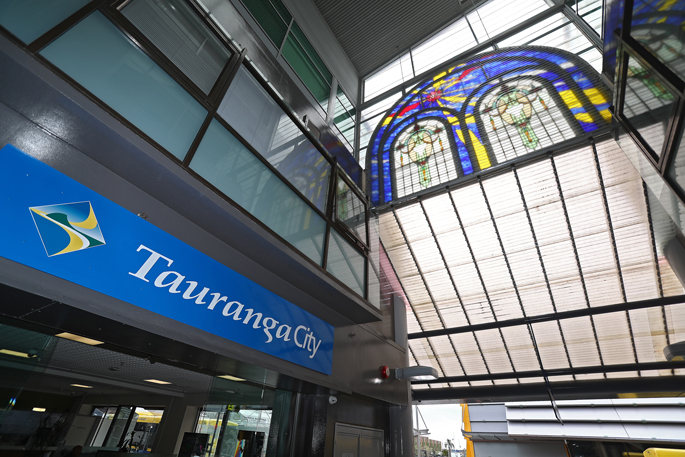The Policy Committee today discussed proposed changes to three bylaws: freedom camping, prostitution and trade waste.
Throughout the past 18 months Tauranga City Council has reviewed a number of the city's bylaws, to ensure they continue to protect our community and environment.
Committee Chairman Steve Morris says bylaws help make sure people can live, work and play in Tauranga safely and free from nuisance.
'They are Tauranga-specific laws that help us protect our environment and people's enjoyment of our public places, and give us as Council the means to minimise the potential for offensive behaviour," says Steve.
'It's important for us as Council to hear from different perspectives to make the right decisions so I'd like to thank everyone who participated in the consultation processes and helped us shape these proposals."
Now that the committee has made its recommendations, Council will decide whether or not to formally adopt the reviewed bylaws at its meeting on Tuesday, June 4.
Freedom camping bylaw
The freedom camping bylaw was first adopted in 2013 and was due for its first review.
This bylaw allow us to control freedom camping in Tauranga by defining areas of council land where freedom camping is prohibited or restricted. It also gives us the ability to set necessary restrictions and regulate freedom camping in our city, including the power to issue fines.
The main changes to the bylaw since its previous edition are:
- prohibiting freedom camping at Macville Park, Omanu Surf Club car park, Sulphur Point, Cliff Road car park, Greerton Road car park, Turret Road, Shadelands Lane, Oceanview Downs and Papamoa Domain
- reducing the number of freedom camping sites at Kulim Park from five to two, and at Whareroa Reserve from six to four
- removing the 3.5 tonne weight restriction at Kulim Park
- increasing the number of freedom camping vehicles at Mount Greens car park (five to 10), Cambridge Park (two to six), Carlton Street Reserve (six to eight) and Marine Park 1 (increase to eight all year round)
- including Marine Park 2 as a new freedom camping area and permit three freedom camping vehicles
- allowing freedom camping vehicles to park outside of a marked and formed parking space in Mount Greens carpark and in all council carparks (excluding Dive Crescent and Strand Waterfront carparks) between 8pm and 7am
- giving the Chief Executive the power to temporarily waive/modify the freedom camping rules or close/restrict a freedom camping area
- giving Council the ability to change the location of designated freedom camping parking sites within a permitted freedom camping area by publicly notified resolution
- requiring public applications to temporarily waive or modify the freedom camping rules to be in writing at least 14 days before any changes taking place.
Council is also proposing various other minor amendments for clarity and consistency, including additional definitions.
If Council adopts the bylaw, it will come into force on 1 July 2019.
Prostitution bylaw
The prostitution bylaw was last adopted in 2008 and was therefore due for review.
In 2003, prostitution was decriminalised in New Zealand through the Prostitution Reform Act 2003 so council is unable to prohibit the activity in Tauranga.
However, council can adopt bylaws to determine where brothels can operate and how they can advertise their services in our city.
The main changes to the bylaw since its previous edition are:
- including a definition of small owner-operated brothels (no more than four sex workers, who retain control of their earnings)
- clarifying that small owner-operated brothels are excluded from the bylaw's location restrictions, this means that they can operate in residential areas but not near schools and places of worship
- removing the requirement for a premises consent (all brothels would still need to comply with relevant planning rules)
- simplifying the existing signage requirements
- excluding areas of open space, public reserve and the Baypark special use area from the permitted locations for brothels with five or more workers.
Other minor amendments have been made for clarification and consistency, including an additional definition.
If Council adopts the bylaw, it will come into force on 1 July 2019.
Trade waste bylaw
The trade waste bylaw was last adopted in 2008 and was therefore due for review.
Trade waste is liquid (usually water) used in trade and industrial operations, that is discharged to the wastewater system.
The trade waste bylaw helps protect both the health of our community and the city's infrastructure by setting pollutant limits in trade waste discharges, and enabling enforcement action where necessary.
The main changes to the bylaw since its previous edition are:
- prohibiting the discharge of liquid cytotoxic waste to the wastewater system
- setting specific limits on the discharge of liquid pharmaceutical waste to the wastewater system
- replacing references to the ‘wastewater network' with ‘wastewater system' to ensure the bylaw applies to the entire system (the pipes, sewers, pump stations, tanks, treatment plants etc.) not just the network (the pipes).
The first two changes are a result of recommendations by the Minister of Health.
If Council adopts the bylaw, it will come into force on 18 June 2019.



0 comments
Leave a Comment
You must be logged in to make a comment.